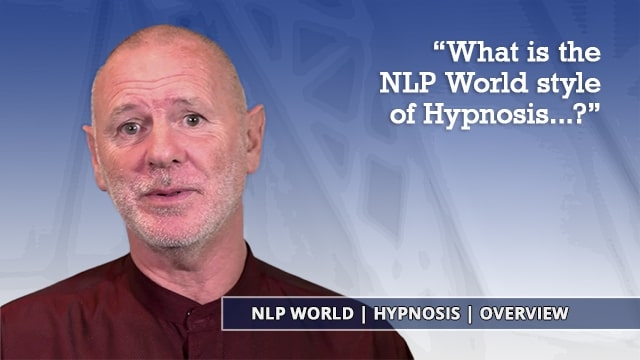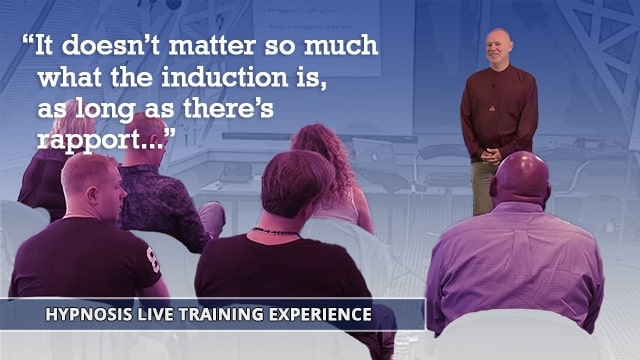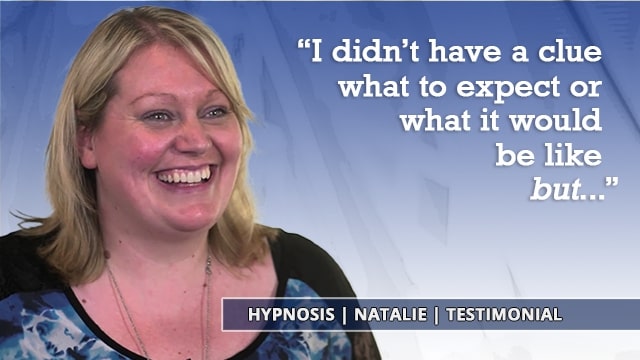Training in Hypnosis is currently offered as part of the NLP World Seven Day NLP Practitioner Training Course.

Hypnotherapy Practitioner Certification,
Accredited by the Association for Integrative Psychology
Discover how hypnosis is all part of everyday life, for example how the moguls of advertising are using it all the time.
You have already seen names like Richard Bandler, Paul McKenna, Derren Brown, Anthony Robbins, and John Grinder, so you know it works!


What Will I Learn on the Hypnosis Certified Training?
- Learn how the Unconscious Mind really works – allowing you to fully understand why some important messages get through and others don’t.
- Get familiar with different inductions – Erickson and Elman, plus Terry Elston’s.
- Learn verbal and non-verbal suggestion – so you can control and direct conversations more effectively.
- Induce and understand deep mind states using fantastic hypnotic deepening inductions, therefore accessing the power of yours and your clients’ unconscious minds.
- Discover the history of Hypnosis – how the myths evolved, what the truth is about who has the power and see where the foundations came from, way beyond traditional psychology.
- Structure post-hypnotic suggestions – enabling direct commands to be used in business, meetings and for healthy clients.
- Utilize deep mind states for healing
Visions only become realities when you focus single mindedly on what you want, NOT what you don’t want. Positive thinking does not make this happen, it is the beliefs and values you carry around that determine this. If those beliefs are veiled in fear, you will unconsciously sabotage your success, despite all of your skills.
During this programme, you will clean up your inner limitations in business and retrain your ‘anchor points’ to jump you into the natural motivation and congruence that successful leaders have in spades.
This process of alignment goes way beyond skills and “tricks”. Integrating NLP into who you are in your work will help you uncover your business potential – it is the real Law of Attraction.
This single shift is what helped a new Finance Director of Forte Group turn around her fractious team after just 2 hours of coaching when she expected it to take many weeks.
What Do Our Students Say About Hypnosis?

I loved the hypnosis part of the course. For a start, I hadn’t expected to laugh quite so much or for so long and had also not realized that hypnosis would go so far beyond my expectations. I found it to be an immensely powerful and very gentle treatment that makes profound change possible in a short time. And besides all of this, it also feels great to be hypnotized!
What is Hypnosis?
Hypnosis could be considered a social interaction in which one person responds to suggestions given by another person (the hypnotist) for imaginative experiences involving changes in perception, memory, and the voluntary control of the action.
Can You Be Hypnotised?
There are large individual differences in response to hypnosis. Hypnosis has little to do with the hypnotist’s technique, and very much to do with the individual’s capacity, or talent, for experiencing hypnosis.
Most people are at least moderately hypnotized. However, while relatively few people absolutely cannot be hypnotized by the same token, relatively few people fall within the highest level of responsiveness (so-called hypnotic virtuosos). There is some controversy over whether hypnotisability can be modified.
Some clinical practitioners believe that virtually everyone can be hypnotized if only the hypnotist takes the right approach. However, there is little evidence favoring this point of view.

Similarly, some researchers believe that developing positive attitudes, motivations, and expectancy concerning hypnosis can enhance hypnotisability. However, there is also evidence that such interventions may only affect behavioral compliance with suggestions, not the subjective experiences that lie at the core of hypnosis.
As with any other skilled performance, hypnosis is probably a matter of both aptitude and attitude: negative attitudes, motivations, and expectancy can interfere with performance, but positive ones are not by themselves sufficient to create hypnotic virtuosity.
What Does the Media Have to Say About Hypnosis?
Hypnotherapy is supported by more scientific research than any other complementary therapy.
Hypnosis has gained credibility in the past five years because of research using the latest brain-imaging technology…. Studies show hypnosis can help treat a multitude of disorders...
Where Does Hypnosis Come From?
The origins of hypnosis extend back to the ancient temples of Aesculapius, the Greek god of medicine, where advice and reassurance uttered by priests to sleeping patients was interpreted by the patients as the gods speaking to them in their dreams.
Franz Anton Mesmer
In the more recent history of hypnosis begins with Franz Anton Mesmer, who theorized that disease was caused by imbalances of a physical force, called animal magnetism, which affects various parts of the body. Mesmer also believed that cures could be achieved by redistributing this magnetic fluid — a procedure that typically resulted in pseudo epileptic seizures known as “crises”. In 1784, a French royal commission chaired by Benjamin Franklin and including Lavoisier and Guillotin among its members concluded that the effects of mesmerism, while genuine in many cases, were achieved by means of imagination and not by any physical force. In the course of their proceedings, the commissioners conducted what may well be the first controlled psychological experiments.
Mesmer’s theory was discredited, but his practices lived on. A major transition occurred when one of Mesmer’s followers, the Marquis de Puysegur, magnetized Victor Race, a young shepherd on his estate. Instead of undergoing a magnetic crisis, Victor fell into a somnambulistic (sleep-like) state in which he was responsive to instructions, and from which he awoke with amnesia for what he had done. Later in the 19th century, John Elliotson and James Esdaile, among others, reported the successful use of mesmeric somnambulism as an anesthetic for surgery (although ether and chloroform soon proved to be more reliably effective).
James Braid
James Braid, another British physician, speculated that somnambulism was caused by the paralysis of nerve centres induced by fixation of the eyes on an object. In order to eliminate the taint of mesmerism, Braid renamed the state “neurhypnotism” (nervous sleep); a term later shortened to hypnosis. Later, he concluded that hypnosis was due to the subject’s concentration on a single thought (monotheism) rather than physiological fatigue.
William James
William James and other early psychologists became interested in hypnosis because it seemed to involve changes in conscious awareness. The first systematic experimental work on hypnosis was reported by P.C. Young, in a doctoral dissertation completed at Harvard in 1923, and by Clark Hull in an extensive series of experiments initiated at the University of Wisconsin in the 1920s and continued at Yale into the 1930s.
Also at Wisconsin during Hull’s time was Milton Erickson, a physician whose provocative clinical and experimental studies stimulated interest in hypnosis among psychotherapists (Hull knew Erickson at Wisconsin, but the immediate source of Hull’s interest in hypnosis was Joseph Jastrow, a prominent psychologist, who was Hull’s mentor).
After World War II, interest in hypnosis rose rapidly. Ernest Hilgard, together with Josephine Hilgard and Andre Weitzenhoffer, founded a laboratory for hypnosis research at Stanford University. Hilgard’s status as one of the world’s most distinguished psychologists helped establish hypnosis as a legitimate subject of scientific inquiry.
Also important in this revival were Martin Orne, Theodore X. Barber, Theodore Sarbin, and Erika Fromm.
Hypnosis has been used as a psychological treatment for a variety of illnesses with apparent success.
While we are not allowed to say that hypnosis cures physical disease, it can be said to be used to enhance relaxation and alleviate pain and other physical discomforts, and therefore they may make a positive contribution to the overall quality of care and of life.
For example, I have worked with personal clients and helped them to release asthma, chronic fatigue syndrome, hay fever, cancer, and many other ailments, yet we agree that our services are to assist the client to do it for themselves!


Our NLP Training Courses Guarantee!
Although what we’re doing is very different from other NLP Training companies, one thing is constant; ours is a very human training.
This approach is not found or taught in books or on large, processed courses. Our experienced team coupled with our limited size groups gives you a unique opportunity for exceptional training and personal development.
Terms & Conditions
If, for any reason, you are unable to come to the training or have to defer your course, you can provide a substitute person at no charge. If you have paid in full and the course is less than one month before the start date, you forfeit your payment (unless you provide someone else who can finish the pre-course work in time).
To take part in a course, you have to have successfully completed 100% the pre-course work supplied to you beforehand. There are 8 hours of MP3’s to listen to and the test should take around 3-4 hours depending on your personal speed. Plus you will need to cater for revision of test with the assistants/trainers to get it to 100%. Please bear in mind that failure to allow enough time or the non-compliance with the initial test procedure can result in us asking you to attend another course or forfeiting your deposit if you choose not to.
NLP World reserves the right to retract (take away or dissolve) any certification with NLP, Time Based Techniques or Hypnosis/Hypnotherapy), if you are deemed not to be using these techniques with integrity.
Cancellation Fees
If you wish to cancel a booking before the start – or the failure of conditions above, the following cancellation fees will be charged:
NLP Four or Seven Day Practitioner – £1770
NLP Master Practitioner (whole or per module) – £2150
The NLP 3 day Experience – £3500
NLP Trainers Training– £1750
Lost Certificate Replacement – £45
If you have paid for the course and have to cancel within a month of the course start date, you can supply a substitute delegate. If you can not do that, you forfeit your full course fees
Secure Transactions
NLP World uses the following 3rd party providers to ensure that transactions and payments are processed securely.


Register for Live NLP Training
(inc. Hypnosis Certification)
If you’re now interested in booking in for our NLP Practitioner Training (including Hypnosis), click on the button below to get instant access to the Online training materials and start your training now.
Interested in our NLP World
Online Clinical Hypnotherapy?
NLP World also provide an Online Clinical Hypnotherapy training course.
For more information, click the button below

